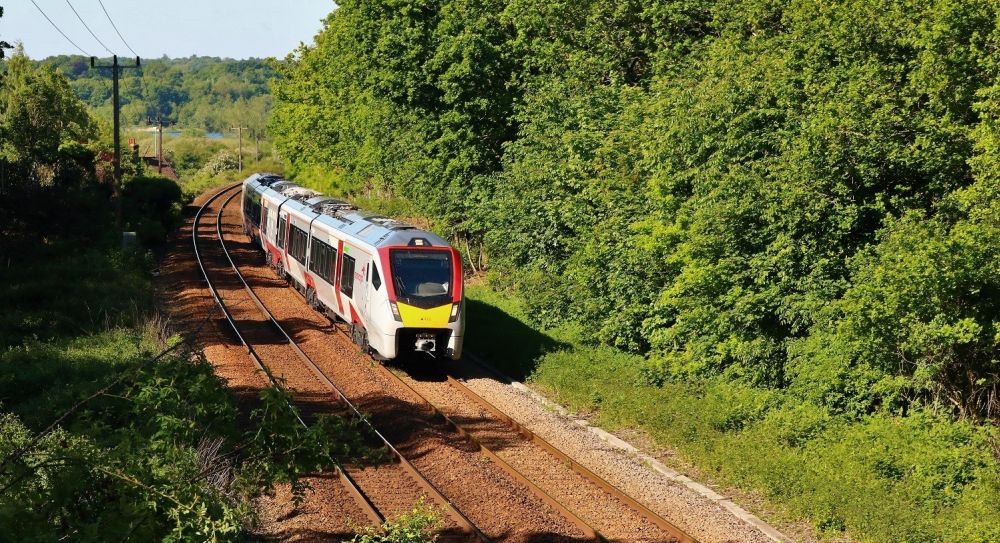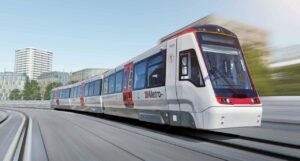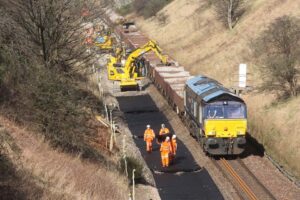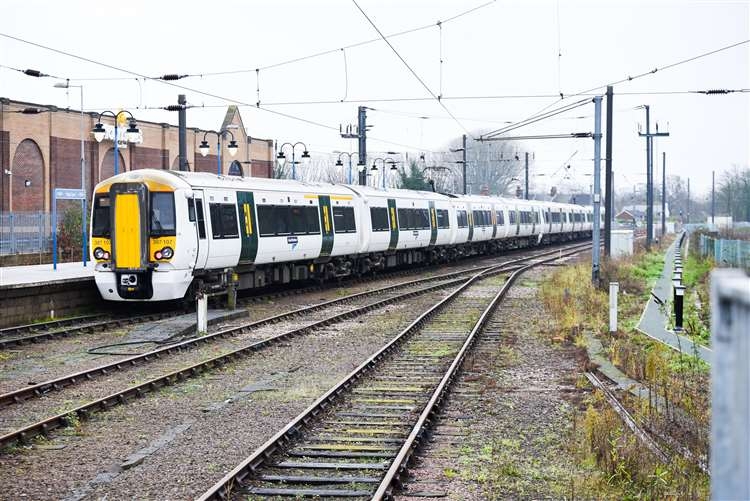
![]()
New government – New thinking? We will continue to lobby
July 2024
As we await formation of a new government, we can only hope that the new administration will be addressing climate change, sustainable planning and infrastructure delivery more seriously than the manifestos and election campaigning have indicated.
An analysis of manifesto policy by Greenpeace and Friends of the Earth showed only the Green Party scoring maximum points for sustainable transport policy – with Labour scoring less than 50% and the Conservatives a woeful 15%.
Over the last decade Westminster has offered only fleeting periods of lukewarm support and relatively minor investment in public transport and railways. We think too much focus was placed on HS2 at the expense of wider infrastructural improvement – and even that project has now been significantly reduced.
But change must come! Even with a pandemic, two years of still unresolved industrial action and the nonsensical pricing of train tickets, train travel has retained strong demand. Figures from the government office of Rail and Road showed another strong year of growth in passenger numbers to March 2024, bringing it back to pre-pandemic levels.
UK transport remains a principal emitter of C02, the domestic transport sector being responsible for 28% of all emissions (Gov.UK figures, 2022). Much trust is now being placed on electric cars to reduce this burden, but analysis by the Rail Delivery Group earlier this year found that even an electric car journey is 2.5 times more polluting than an equivalent rail journey. (A hybrid vehicle was four times more polluting and a petrol or diesel car was nine times more polluting.)
If the next government are serious about meeting their legal commitments to tackle climate change, transport planning must be absolutely central to their plans. Investment in rail travel, prioritising the resolution of industrial action and addressing ticket pricing through appropriate regulation must be at the heart of their plans.

Bicycle / train-based transport systems have been greatly developed across many European countries in recent years. In Holland nearly 50% of rail passengers now arrive at stations by bicycle. (click photo to enlarge)
![]()
Network Rail back ‘Tram Trains’
September 2023
 Whilst ‘official’ UK government policy continues to vacillate on a range of issues – sustainable planning for the 21st century simply must shift away from its current dependency on road traffic towards mixed transport options. This will offer long-term social, environmental and economic benefits.
Whilst ‘official’ UK government policy continues to vacillate on a range of issues – sustainable planning for the 21st century simply must shift away from its current dependency on road traffic towards mixed transport options. This will offer long-term social, environmental and economic benefits.
This is what we are now seeing in many other parts of Europe where heavy investment in trains, trams, buses and cycle infrastructure has been backed-up with subsidised incentives to encourage a faster shift away from car travel. Super-cheap travel passes are now available in Germany, Austria and Spain and completely free public transport is provided in places like Luxembourg, Malta and a number of European cities.
Even in cities in England, local policy is now backing public transport – most recently with the launch of the ‘Bee Buses’ in Manchester as part of a new integrated public transport system including a fleet of 50 electric buses. As well as reduced congestion and cleaner air, the scheme is aimed at bringing back passengers to a system that became increasingly unattractive to people under a deregulated private competition system.
The oft-quoted reason for not backing more public transport is cost. But when a new 1.5-mile stretch of single carriageway road to provide access to housing planned at King’s Lynn is now estimated to cost £85m (even before it is fully designed and tendered), is continued car dependence really a cheaper option? Ultimately such costs are all from the public purse. We need to spend our money on the best long-term solutions.
Based on cost-benefit analysis, Network Rail are now favouring ‘Tram-Train’ systems, which can run on traditional ‘heavy rail’ lines, but are also safe to run on ‘light rail’ tracks as the design allows flexibility on platform design. This means that they can facilitate extensions from existing rail corridors into town centres and new developments – with low-speed sections in street situations and fast connections on rail lines.
Other advantages include the reduced cost of infrastructure for features such as level crossings and stations, as well as the benefits of clean, electrified, mass transit vehicles. They are now widely used in Europe and have been introduced as part of the modernisation of the railways in South Wales.
Network Rail are now supporting Tram-Trains as the preferred system for the March to Wisbech and Cambridge to Haverhill rail reopening projects – where they envisage that additional spurs could be provided into planned housing development at Wisbech and existing business parks at places like Babraham and Sawston.
It is envisaged that a sub-regional Tram-Train fleet could also run on heavy rail lines to provide connections to Peterborough, Ely, Cambridge and Newmarket. It does not take a genius to realise that extending those ideas to King’s Lynn and Hunstanton makes absolute sense. And why not a King’s Lynn link to Peterborough via Wisbech and Norwich via Swaffham and Dereham?

PH Railfuture East Anglia 2023
![]()
A nostalgic look backwards – or a reminder of what we could and should still have?
Easter 2023
It has been another fraught Easter for King’s Lynn and West Norfolk as holidaymakers poured along our local roads on the way to the Norfolk coast. This has resulted in traffic chaos and hours of almost complete gridlock in King’s Lynn on three separate days, with two serious accidents at the Hardwick roundabout, including at least one very sad fatality.
Surely anybody who still thinks these (now annual) periods of severe road congestion can be solved by more investment in roads and a road-based transport system has taken leave of their senses? We simply must shift to a properly multi-modal transport network. And railways could offer so much! Not only statistically safer, reliable mass transport – but advantages for a low carbon transport network that supported cycling and walking as well. In fact, the very model that many other countries are investing in right now.
At KLHRC we are not big on nostalgia – but we share with you below 15 minutes of a documentary film from 1968 recording the last few weeks of the Dereham to King’s Lynn railway. Like the King’s Lynn to Hunstanton railway, this line was not recommended for closure by Beeching, but was instead run down by British Railways until it was simply unviable. The characters in the film reflect the mood and ideas of the times – that railways were ‘old fashioned’ and unpopular. But were they? It now seems utter madness that more than 100 years of investment in railway infrastructure, not to mention an experienced and diligent workforce, were written off by a couple of decades of one-eyed transport policy making.
How many frustrated car drivers would have preferred a comfortable train ride to the seaside this Easter?
![]()
In spite of … everything … rail schemes are still coming forward
March 2023
 It has been a frenetic 12 months in British and world politics. As this government limps towards the finishing line, previous commitments to transport infrastructure investment seem to be falling by the wayside. Last week substantial cuts (or at least, ‘delays in expenditure’) were announced for HS2 and ‘active travel’ programmes.
It has been a frenetic 12 months in British and world politics. As this government limps towards the finishing line, previous commitments to transport infrastructure investment seem to be falling by the wayside. Last week substantial cuts (or at least, ‘delays in expenditure’) were announced for HS2 and ‘active travel’ programmes.
We have also heard that many of the railway schemes awarded grants from the ‘Reversing Beeching’ scheme may not now progress past an initial feasibility study.
And yet, despite strikes, inflation and general gloom, the DfT reported toward the end of 2022 that rail passenger numbers had recovered to 99% of pre-covid levels.
And three new railway reopening schemes are progressing. The 18-mile-long Newcastle to Ashington line in Northumberland, costing £166Mn (including road improvement works and 6 refurbished stations), is due to open in summer 2024. Northumberland County Council anticipate cost benefits of £0.5Bn to the local economy.
The 5-mile long Levenmouth railway reopening in East Fife is expected to open in Spring 2024 and will bring a catchment of 40,000 people within a 75 minute rail journey of Edinburgh.
And a strategic business case has been completed for the 5-mile long Plymouth to Tavistock reopening in Devon. The County Council are now seeking a £3Mn government grant to take the project to the next stage. The railway would underpin new business investment at Devonport and housing expansion near Tavistock and is expected to carry 400,000 passengers a year.
So rail investment is happening, the pre-operational cost benefits still look good – and we know from previous schemes, the eventual benefits often eclipse those expected.
![]()
Still hopeful of a transport re-set
Comment — September 2022
We were pleased to see that reopening the King’s Lynn to Hunstanton railway was included in the Transport East strategic vision for future transport development in East Anglia. To us it seems like straightforward common sense to provide reliable direct public transport to north-west Norfolk — with obvious benefits for tourism, community connectivity and the environment.
But on the whole, the Transport East investment strategy is still very orientated towards road building. This remains a very expensive way of delivering transport infrastructure (environmentally and financially) and the continuing UK preoccupation with road transport does not appear to be shared by most other European nations.
Hopes rise for restoration of disused Norfolk railway
![]()
More evidence of rail investment offering excellent value for money
Comment — September 2022
The ‘Dartmoor Line’ from Exeter to Okehampton reopened to passenger services only last November and has already smashed estimates for expected use with more than 120,000 journeys made by late August (see link to BBC report).
Meanwhile in West Norfolk we experienced yet another summer of traffic mayhem, as holidaymakers sat in long queues in record heat in order to get to the coast.
The Government have recently gone rather quiet about their support for railway reopening’s and Transport Minister Grant Shapps, a principle advocate for the ‘Reverse Beeching’ programme, has now been replaced by Anne Marie Trevelyan. Let us hope that her accountancy background allows her to see that the figures really do add up for new railway investment!
Reopened Beeching cut Dartmoor rail line sees 120,000 journeys
![]()
The case for investment in better public transport continues to build
Comment — March 2022
Our spiralling cost of living and particularly the record rises in petrol and diesel prices, can only mean one thing in the longer term. The number of people who can’t afford to own and drive a car will rise. Surveys already indicate that more than 30% of households do not have direct access to a car or van. Hence cutting fuel duty doesn’t directly help 1/3 of households at all.

As the move towards electric cars accelerates and petrol and diesel vehicles are phased out, it is highly probable that this ‘access to transport gap’ will grow.
The rapid rise of the electric bicycle (sales have tripled both in the UK and internationally in recent years) could go some way to provide low-cost transport at the local level.
But for an affordable transport solution for longer journeys, a significant growth in public transport provision must be a key part of a decarbonised transport system. And we think trains — running with either electric or hydrogen power, are likely to be the best solution.
And this conclusion is international. The French government recently announced plans to reopen or upgrade 9200km of rural rail lines as part of an ‘ecological transition and defence of rural life’. They previously announced they would double their rail freight capacity by 2030.
www.euractiv.com/section/politics/short_news/french-government-to-double-railway-freight-by-2030
Meanwhile the German government propose to invest over 12bn Euro to modernise their rail network, with plans to double passenger capacity by 2030, greatly increase freight capacity, and, by the way, create 100,000 new jobs in the process.
www.webuildvalue.com/en/infrastructure/rail-transport-germany-reopening-railways.html
In November the UK Government announced the ‘integrated rail plan’ (IRP) for the north and midlands — but we need similar investment in East Anglia. The south-east also has areas of deprivation. We also need ‘levelling up’!
The need for investment in appropriate, sustainable public transport infrastructure is clear and obvious. We just need to stop faffing about and get on with it! We need the funding Mr Sunak!
![]()
Some bad news / some good!
We had the disappointing news last week that we were not awarded money by DfT to assist a more detailed feasibility study on the reopening scheme. The main reason for this seems to be that the Government were swamped with proposals for railway reopening schemes from all over the country. No schemes were funded in East Anglia.
The rush for the funding is however testament to the widespread support rail travel has in the UK and the realisation that it can and should be a major part of low-carbon transport plans, sustainable development and improved ‘connectivity’.
And there is good news as well. The County Council are committed to the scheme and have provisionally suggested they could cover the cost of the next stage of feasibility studies themselves. We have also passed the 8000 mark on our petition. Our growing group of supporters understand this is a project that can underpin the future success of our area.
![]()
Keep our rail dream on track, King’s Lynn to Hunstanton campaigners urge council leaders
By Allister Webb
email hidden; JavaScript is required
Published: 17:27, 01 November 2021
County council leaders are being urged to commit financial backing for the fight to restore the rail link between Lynn and Hunstanton.
The move has been outlined after the campaign to re-open the line, which shut more than 50 years ago, missed out on a share of a central Government funding stream to revive lost links.
But campaign leaders say they have been encouraged following discussions with ministers.

And Hunstanton county councillor Andrew Jamieson says the campaign has come too far to be halted now.
He said: “A new railway offers so much promise for bolstering our local economy for decades to come, so we must not drop the ball now.
“The Hunstanton scheme has done magnificently to get this far in only a couple of years, which is a tribute to the enthusiasm and well-researched work of the local campaign group.”
The hope of bringing train services back to Hunstanton was raised last summer when the scheme was included in a list of projects to be considered for a share of Government funds intended to help reverse the Beeching cuts of the 1960s.
But the latest announcement from the Restoring Your Railway Fund, issued by the Department for Transport on Thursday, did not include the Lynn to Hunstanton line or any other scheme in this region.
Leaders of the King’s Lynn Hunstanton Railway Campaigning group say a more detailed, independent study is now needed to establish the potential travel benefits of the scheme.
It would explore how the line could potentially take passenger and freight traffic off the roads, as well as improving travel access to the Queen Elizabeth Hospital, in either its present or any future location.
Such an assessment is likely to cost tens of thousands of pounds to compile and had been the subject of the campaign’s bid to the Government.
The county council has already thrown its weight behind the campaign and was among the bodies to support the funding bid.
Martin Wilby, the authority’s cabinet member for transport, said today: “While we were disappointed that the Government rejected our initial bid for work on the reinstatement of the King’s Lynn-Hunstanton line, we are determined to ensure Norfolk has the transport infrastructure its needs to meet the demands of the 21st century.
“We are currently considering our next steps and will always consider well thought out plans to address the needs of communities in West Norfolk.”
Mr Jamieson said he also plans to hold talks with West Norfolk Council leader, Stuart Dark, on the subject.
Meanwhile, campaign leaders have also renewed their pleas for the public to sign their online petition calling for restoration of the line. Nearly 8,000 people have already backed the call via the change.org campaign website.
Group spokesman Howard Johnston said: “We want to make it possible for our young people to get to places like Cambridge to work. Hunstanton and its surrounding villages should also become famous for their wonderful attractions, not for the bumper-to-bumper traffic queues on the A149 road every summer. The case for rebuilding railway is overwhelmingly strong, and adding your name to the on-line petition is a good way to demonstrate community solidarity.”
![]()
Young People get it
 Even though we would regard our campaign group to be largely comprised of more ‘mature’ members of the community — even we understand that transport policy must fundamentally change in coming years in order to achieve a carbon neutral economy. This article suggests that 70% of young people think that trains must be a part of that agenda.
Even though we would regard our campaign group to be largely comprised of more ‘mature’ members of the community — even we understand that transport policy must fundamentally change in coming years in order to achieve a carbon neutral economy. This article suggests that 70% of young people think that trains must be a part of that agenda.
Seven out of ten young people want the country to ‘Go Green by Train’ to tackle the climate emergency — Politicians should bear this in mind
By Danny Longhorn — RailBusinessDaily — 18thOctober, 2021
The inaugural Community Rail Week, 18th-24th October, is involving hundreds of community rail partnerships and volunteer groups running the ‘Go Green by Train’ campaign with activities to promote their local railways, and giving communities and young people a voice on green transport.
Organised by Community Rail Network and sponsored by Rail Delivery Group, the campaign week is focusing on young people’s views, voices and futures, as a new survey is released exploring travel habits and attitudes to green travel among 1,000 16–24-year-olds:
- Seven in ten (70%) young people are keen to see more people using trains in the future, with the vast majority (90%) saying the environment and climate emergency is an important issue to them;
- Around half (48%) travel by train at least once a month, but one in six (17%) have rarely or never been on a train, or can’t remember when they last did;
- While 94% have a station near enough for them to use, most (67%) admit there are factors getting in the way of them using trains, including practicalities with walking, cycling, or getting a bus to the station, being worried about cost, or driving or getting lifts being more convenient.
With greener transport recognised as a fundamental part of the solution to the climate emergency, Community Rail Week and the ‘Go Green by Train’ campaign looks to drive change at community level through the efforts of 74 community rail partnerships and 1,000 station friends groups across Britain — working to help people get out of their cars and onto trains and other sustainable modes. Activities and events during the week include sustainable travel workshops, creative competitions and exhibitions, ‘Go Green by Train’ pledge campaigns, engagement with schools and youth groups, ‘try the train’ trips, and question time style sessions with young people discussing the environment and transport.
Transport has a huge role to play if the UK is to reach its target of reducing greenhouse gas emissions by 100% of 1990 levels, or ‘net zero’, by 2050. Figures show that:
- Transport is now the largest emitting sector in the UK, making up 27% of domestic emissions in 2019;
- Rail accounted for just 1% of domestic transport emissions in 2019, despite representing 10% of the total distance travelled, and is the greenest form of transport after walking and cycling;
- One train can remove up to 500 cars off our roads;
- For a 30-mile journey, travelling by train instead of by car can reduce emissions by up to 86%.
Jools Townsend, chief executive of Community Rail Network, said: “As we approach the international climate talks in Glasgow, Britain’s community rail movement is coming together to highlight the great importance of green travel at a local and global level. Transport is now the biggest contributor of UK greenhouse emissions, so we face a pressing challenge to decarbonise the way we get around, for the sake of future generations — plus our communities can benefit now from reduced traffic and pollution. Rail, combined with buses, walking, cycling, and shared mobility, provides a huge part of the solution: shifting as many journeys as we can onto these modes, breaking down green travel barriers, and reducing car use can help us forge a more sustainable, healthy, inclusive future.
“We’re excited to launch our first Community Rail Week with events and activities in communities across Britain, raising awareness and exploring how we can enable and empower more people to feel confident and able to go green by train.”
Andy Bagnall, director general at the Rail Delivery Group, said: “Trains are inherently green so when people go by rail it’s more than a journey — it’s literally helping to save the planet!
“In future, we want trains to be the backbone of a decarbonised transport network so, as well as supporting initiatives like Community Rail Week, we want to work with government to reform ticketing and fares — if it’s easier for people to find and buy a good value ticket, more people will use rail as a green alternative to other ways of travelling.”
Photo credit: Community Rail Transport
![]()
On Track for a Comeback
KLHRC are awaiting announcement from the Department of Transport to see if they have been successful with their bid for further feasibility study funding. We are under no illusions though, as communities across the country have mobilised to put in similar strong bids. Across the country people understand that a shift back towards rail transport is needed and long overdue. Many disused lines have been better protected than the King’s Lynn to Hunstanton route — but even if our line needs substantial new sections, the terrain could make it relatively easy to build.
www.bigissuenorth.com/features/2021/09/on-track-for-a-comeback
![]()
James Wild MP encourages people to sign petition for Lynn to Hunstanton rail restoration
James Wild MP is encouraging constituents to sign petition to back bid to restore King’s Lynn to Hunstanton railway as part of government £500 million Restoring Railways Fund.
Next month is the deadline for Norfolk County Council and James to make a fresh submission to the final round of the £500m Restoring Railways Fund. James is supporting calls from Cllr. Andrew Jamieson for emails and letters of support for the project ahead of the deadline for submissions on March 5th.
Press Release
How you can help get our railway back
Local businesses and residents can play a big role in deciding whether Hunstanton and several major communities along the North West Norfolk coast get a railway link to King’s Lynn, Cambridge and London.
They are being urged to write letters and send e-mails of support to help secure a £50,000 government grant to push the project forward. The strict deadline is March 1st.
View the full Press Release (pdf file)
![]()
Torquay use Government railway station fund to benefit urban expansion plans
Torbay Council have shown how rail infrastructure funding can help to make new residential areas more sustainable and diminish the need for car dependency.
Showing considerable forward thinking, the Council has also included the provision of this key transport infrastructure as part of their recent Town Deal funding bid.
Surely this example is very relevant for urban expansion plans in West Norfolk?
Almost £8 million awarded for new Torquay station
![]()
Restoring your Railways Idea Funding Application — Update 27-11-2020
The campaign to re-open the King’s Lynn-Hunstanton railway has been given a major boost this week with an invitation from the government to submit further details to strengthen the case for funding.
The door is open for more talks, Government tells Hunstanton rail revival campaigners
![]()
Local businesses support rail infrastructure investment
A leading business group has given its backing to the new drive for a long-sought upgrade of the main rail link serving West Norfolk.
Business group backs long-sought upgrade of West Norfolk rail link
Lynn News 30th October 2020
![]()
Fear about catching Covid 19 on public transport appears to be misplaced …
The risk of coronavirus spreading on public transport has remained substantially low through the pandemic, several international studies have shown.
Coronavirus: Why public transport could be safer than we thought
Sky News 7th October 2020
![]()
Hydrogen-powered train makes UK maiden journey.
A hydrogen-powered train has travelled on Britain’s rail network for the first time. The prototype, called the Hydroflex, made a 25-mile round trip in Warwickshire, reaching speeds of up to 50 mph. Its next phase is to move the hydrogen tanks, fuel cell and battery out of a carriage and stash them underneath the train. The aim is for the train to start carrying paying passengers by the end of 2021.
Hydrogen-powered train makes UK maiden journey
BBC 30th September 2020
![]()
On 6th September 2015 the first passengers travelled on the Borders Railway.
The £294 million pound line, connecting Tweedbank to Edinburgh, was the longest domestic line to be built in the UK in a century.
Five years on the Borders Railway proves the benefit of reopened railways…
ITV 6th September 2020
![]()
GERMANY:
More than 200 closed, mothballed or freight-only lines could be reopened to serve 291 towns and a population of around 3 million people, according to proposals drawn up by the Association of German Transport Companies VDV and rail lobby group Allianz pro Schiene.
Its not just here – German Govt announces plans to reopen 4000km of railway
Railway Gazette International 9th July 2020
![]()
Final approval of the business case for re-opening the March to Wisbech rail link was given the green light today (Wednesday) by the Cambridgeshire and Peterborough Combined Authority (CAPCA).
First trains along restored Wisbech to March line could be running by 2028 after business case gets the green light
Wisbech Standard 8th July 2020
![]()
The King’s Lynn to Hunstanton railway reopening
A proposal has been shortlisted as one of 50 projects across Britain that may be awarded funds by the Department of Transport for a detailed feasibility study. A bid submitted by Norfolk County Council in June is one of only two projects in East Anglia that have made the list. The other project is a proposal by the Mid Norfolk heritage railway group to run a service between Dereham and Wymondham.
The King’s Lynn Hunstanton bid proposes to reopen the former line as part of the national rail network — allowing communities in north-west Norfolk to once again have quick, reliable public transport to Cambridge, London and beyond. It would also provide an alternative to road-based travel for the thousands of day trippers and holidaymakers that visit Norfolk every year. There would also be opportunities for the line to be used for freight — considered to be a key goal for reducing road traffic and pollution in coming decades.
‘Biggest game changer in a generation’ – campaigners hail £100m rail plan
EDP 3rd July 2020
Government to examine King’s Lynn to Hunstanton railway bid
Lynn News 3rd July 2020
The ’20 minute’ coastal train line near Cambs that could re-open soon
Cambridgeshire Live 2nd July 2020
![]()
Network expansion, new inter-regional services and new stations
- Delivery of East West Rail, linking Norwich, Thetford & Cambridge to Oxford to improve connections between E. Anglia & central, southern and western England.
- Continued liason with promoters of private railways to provide support & action where appropriate, although in the short-term at least resources cannot be provided.
- King’s Lynn to Hunstanton
- Long-term, consider feasibility of mainstream passenger services to Dereham utilising exisiting private rail line.
- New station near Broadland Business Park at Norwich.
King’s Lynn to Hunstanton — reinstating
Previously it has not been seen as feasible to consider reopening due to, amongst other things, the cost of reinstating the line & that it is compromised by development. However, no technical work had been undertaken to examine this in detail & therefore there was an unproven business case. The county council has recently agreed to look at whether there is likely to be a business case for reopening, albeit probably not on the exact original alignment due to, amongst other things, development compromising reopening. This work should report in early summer 2020.
Norfolk County Council committed to a feasibility assessment of the Hunstanton railway link as part of their ‘Norfolk Rail Prospectus’ which closed at the end of February 2020
![]()
The IRJ editorial team has put on its thinking cap to produce a 12-point plan to help rail become carbon free and take on a greater share of the transport burden. David Briginshaw outlines how rail can up its game in the battle against climate change.
How railways can contribute to a zero carbon economy
International Railway Journal 23rd December 2019
![]()
The reshaping of the railways left deep scars, with towns and villages isolated, and London all-important
Without the Beeching report there might not have been Brexit
The Guardian 6th October 2019
![]()
Officials at County Hall are set to commission a study looking at the potential viability of re-opening the line, 50 years after it closed.
Hunstanton rail campaigners welcome county study plan, but warn action needed soon on ‘connection crisis’
Lynn News 16th September 2019
![]()
The prospect of restoring Hunstanton’s rail link has been handed a boost, with NCC set to explore whether it would be viable to re-open it.
Boost for bid to revive railway link after over half a century
EDP 13th September 2019
![]()
At a time when the Government is spending billions of pounds on preparations for a ‘no deal’ Brexit, which may never happen, it was refreshing to learn that it is to launch a review of High Speed 2, which also may never happen.
Surely some of that HS2 money could be better spent right here?
Lynn News 27th August 2019
![]()
The railway was closed in 1969 — not as a result of the Beeching Report but mainly because of a litany of British Rail cutbacks that took no account of the needs of isolated coastal resorts
King’s Lynn to Hunstanton Reopening Campaign
RailFuture 7th June 2019
![]()
After a long hard campaign by Railfuture and affiliated groups, the government has stumped up the extra £32m needed to reopen the railway line to Portishead.
Portishead Line to Reopen
RailFuture 17th April 2019
![]()
The UK Government has announced its backing for a feasibility study into an extension of the Borders Railway.
UK Government announces support for feasibility study into Borders Railway extension
Railway Technology Magazine 1st April 2019
![]()
A £317m project designed to tackle bottlenecks has actually made traffic jams worse on dozens of major roads, a government-owned company has admitted.
£300m traffic jam-busting scheme made journeys longer, Highways England admits
Independent 7th April 2019
![]()
Hunstanton’s rail link must be restored to ensure the town’s future prosperity, a meeting heard.
Reopening rail line ‘vital’ for Hunstanton
EDP 13th March 2019
![]()
There is an ongoing consultation on Norfolk Greenways which involves the future of disused railway tracks across Norfolk.
Coastal footpath needs to be considered with Greenways
Lynn News 5th February 2019
![]()
Hunstanton provides work in retail and tourism but the tendency for younger people to move away, or commute, tends to be the normal practice.
Time to reconnect Hunstanton to the national rail network
Lynn News 2nd October 2018
![]()
Hunstanton and District Civic Society organised two Heritage Open Days this month.
Civic Society Heritage Open Days a reminder of what has been lost
Lynn News 18th September 2018
![]()
It should be apparent to most local people that Henry le Strange’s greatest gift to Hunstanton was the railway line from King’s Lynn to Hunstanton, which opened in October 1862, and closed in May 1969.
Restoration of the railway line to Hunstanton is 21st-century must
Lynn News 11th September 2018
![]()
If we can build HS2 at a cost of £70 billion, and rising, and we can’t do something with the K.L to Hunstanton line then there is something very wrong.
An interview with Sir Henry Bellingham MP
Hunstanton Town & Around July 2018
![]()
The King’s Lynn Hunstanton Railway received a welcome boost when North-West MP Henry Bellingham showed his full support for the initiative.
Initiative on the right track with MP’s support
Lynn News 6th March 2018
